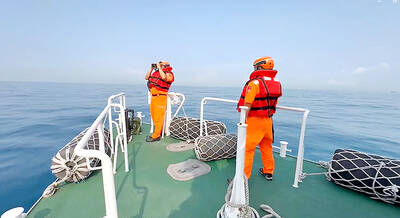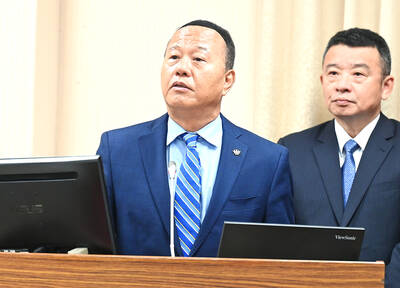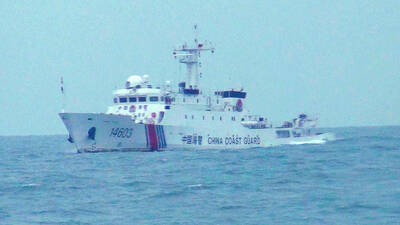Although the government last year reopened investigations into two suspected political murder cases, researchers who read reports produced by the renewed probe yesterday suggested the endeavor was not sincere.
At the request of President Ma Ying-jeou (馬英九), the Taiwan High Prosecutors’ office reopened the investigations into the murder of former Democratic Progressive Party chairman Lin Yi-hsiung’s (林義雄) mother and twin daughters in 1980, and the death of professor Chen Wen-chen (陳文成) in 1981.
Lin’s family was murdered on Feb. 28, 1980, while he was being detained on charges of insurrection after co-organizing a demonstration against the authoritarian regime.

PHOTO: CNA
Lin’s mother and twin daughters were found stabbed to death at home, while his eldest daughter was seriously injured.
The perpetrator and motive were never established, but the killings are widely believed to have been politically motivated, with some suggesting security agencies were involved.
Chen’s death occurred the following year. A statistics professor at Carnegie Melon University, Chen returned to Taiwan in July 1981 to visit family.
As he had been a long-time supporter of the Taiwanese democracy movement, Chen was interrogated by the Taiwan Garrison Command, which led a crackdown on anti-government activities.
The next morning Chen was found dead on the campus of National Taiwan University.
Some suspected Chen was tortured to death by the Taiwan Garrison Command — allegations the agency denied.
The garrison command said Chen could have committed suicide or accidentally fallen off a balcony.
“We had high expectations when Ma announced the investigations into these cases would be reopened, but we were very disappointed when we read the report from the Taiwan High Prosecutor’s Office,” said Wu Nai-teh (吳乃德), a research fellow in sociology at Academia Sinica.
“The special investigation panel did not pursue the new evidence it had discovered. Maybe this shows what Ma really has in mind,” Wu told a forum organized by the Taiwan Association for Truth and Reconciliation.
In the case of Lin’s mother and daughters, the prosecutors found that the murderer made a phone call from Lin’s house to a restaurant after committing the crime, but did not say anything.
Although police knew about the call, that fact has been hidden for the past 30 years.
“The phone call may have been a signal from the killer to whoever ordered the murder of Lin’s family members, and could have been key evidence in breaking the case” Wu said. “The investigation panel could find something if it tried to find out why the phone call was concealed.”
In addition, instead of interviewing Lin’s neighbors and relatives — who may have been too scared to tell the truth 30 years ago — the investigation panel relied on interview material gathered in 1980, Wu said.
As for Chen’s case, attorney Arthur Shay (謝穎青) said he was disappointed that the panel had not looked into contradictions in the 1981 investigation report. The new report treated many questionable “facts” listed in the old report as accurate, Shay said.
“The [old] report says Chen fell from the east side of the library, but his body was found on the north side. It says no broken branches were found at the site, yet Chen would have fallen through bushes before hitting the ground on the north side if he fell from the east side as the report says,” Shay said.
Michael Lin (林世煜), an independent researcher into political persecution during the Martial Law era and a volunteer at the Dr Chen Wen-cheng Memorial Foundation, said the renewed investigations were not aimed at discovering the truth of the matter.
“They reopened the investigations only to close the cases,” Lin said. “They obviously just wanted to prove that security agencies were not behind [them].”

GOOD DIPLOMACY: The KMT has maintained close contact with representative offices in Taiwan and had extended an invitation to Russia as well, the KMT said The Chinese Nationalist Party (KMT) would “appropriately handle” the fallout from an invitation it had extended to Russia’s representative to Taipei to attend its international banquet last month, KMT Chairman Eric Chu (朱立倫) said yesterday. US and EU representatives in Taiwan boycotted the event, and only later agreed to attend after the KMT rescinded its invitation to the Russian representative. The KMT has maintained long-term close contact with all representative offices and embassies in Taiwan, and had extended the invitation as a practice of good diplomacy, Chu said. “Some EU countries have expressed their opinions of Russia, and the KMT respects that,” he

An increase in Taiwanese boats using China-made automatic identification systems (AIS) could confuse coast guards patrolling waters off Taiwan’s southwest coast and become a loophole in the national security system, sources familiar with the matter said yesterday. Taiwan ADIZ, a Facebook page created by enthusiasts who monitor Chinese military activities in airspace and waters off Taiwan’s southwest coast, on Saturday identified what seemed to be a Chinese cargo container ship near Penghu County. The Coast Guard Administration went to the location after receiving the tip and found that it was a Taiwanese yacht, which had a Chinese AIS installed. Similar instances had also

VIGILANCE: The military is paying close attention to actions that might damage peace and stability in the region, the deputy minister of national defense said The People’s Republic of China (PRC) might consider initiating a hack on Taiwanese networks on May 20, the day of the inauguration ceremony of president-elect William Lai (賴清德), sources familiar with cross-strait issues said. While US Secretary of State Anthony Blinken’s statement of the US expectation “that all sides will conduct themselves with restraint and prudence in the period ahead” would prevent military actions by China, Beijing could still try to sabotage Taiwan’s inauguration ceremony, the source said. China might gain access to the video screens outside of the Presidential Office Building and display embarrassing messages from Beijing, such as congratulating Lai

Four China Coast Guard ships briefly sailed through prohibited waters near Kinmen County, Taipei said, urging Beijing to stop actions that endanger navigation safety. The Chinese ships entered waters south of Kinmen, 5km from the Chinese city of Xiamen, at about 3:30pm on Monday, the Coast Guard Administration said in a statement later the same day. The ships “sailed out of our prohibited and restricted waters” about an hour later, the agency said, urging Beijing to immediately stop “behavior that endangers navigation safety.” Ministry of National Defense spokesman Sun Li-fang (孫立方) yesterday told reporters that Taiwan would boost support to the Coast Guard